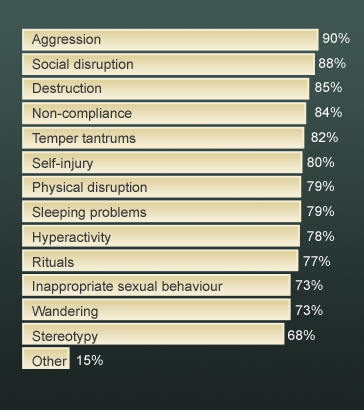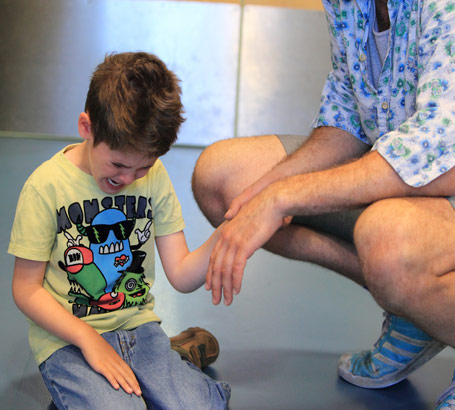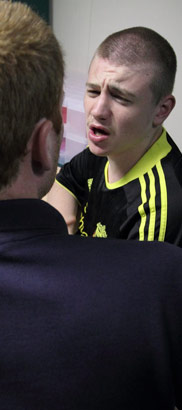Children with learning disabilities are entitled to live in their local
communities and to have the same opportunities as every other child. But
challenging behaviour can result in children being excluded, and families
may feel increasingly isolated and confined to their home. That's why
early support for families is so important - with the aim of preventing
behaviour becoming such a problem. Support should not simply be 'advice'
from professionals, but should be about getting the right support, in
the right place, at the right time.
Social Care Institute for Excellence,
2011
Challenging behaviour is the main reason why children are placed in 38
or 52 week placements in residential schools... and is also a key factor
for families being unable to access short breaks (or respite care), and/or
the child being unable to access educational, therapeutic and/or community
or social activities.
Beresford, 2009
After coping for a number of years with Gary's behaviour and trying to
protect his two younger sisters, trying to keep the household in a calm
mood and living on my nerves, I got to a stage where I just couldn't cope.
I was constantly getting hurt by Gary. At his special school they had
three staff looking after him, but were going to have to exclude him.
It was only at this stage that help was there. Gary went in respite Monday
to Friday and we were given a list of residential schools to go and visit.
A parent in Challenging Behaviour Foundation, 2004

Seventy-three parents whose sons and daughters were placed in a 52-week residential special school identified the following behavioural challenges presented by their children:
Occupational therapist and psychologist suggested ways to improve behaviour
patterns, but suggested ideas do not work when trying to comfort hurt
siblings or do domestic chores.
A parent in McGill et al, 2006
Parents noted the following factors as influencing the need for the placement:
- Difficulty coping with their son or daughter's challenging behaviour.
- The need for a 24-hour consistent behaviour management approach.
- Inability of the local special school/respite service to cope, leading to exclusion.
- Lack of staff expertise in behaviour management and appropriate teaching strategies.
- Ineffective professional advice and assistance.
- Lack of sufficient respite care.
managing behaviours

In her review of behaviour management training for parents, Beresford (2009) found evidence of:
- Parent training in behaviour management having positive effects on their perceived self-competence and parenting skills.
- Promising improvements in a son or daughter's relationships and behaviour after parents had attended training.
- Generic and adapted behaviour training programmes being helpful.
and family support

The Challenging Behaviour Foundation helps families of children and young people with severe learning difficulties and challenging behaviour, and the professionals who work with them. In summary, it aims to:
- Provide information and support.
- Improve local service provision.
- Influence opinion and policy.
- Promote and disseminate relevant research.

Visit the:
and read the:
Make a list of what your school currently does to support parents whose sons or daughters display challenging behaviours. Consider how the school could improve that support.
With permission from senior leadership, talk with one or two parents about their experiences of their son or daughter's challenging behaviour. What are their needs? What do they feel has been most helpful? What ways do they think the school could support them further?

Further information about supporting behaviour can be found in the module
on promoting positive behaviour.
Beresford, B. (2009) The Effectiveness of Behavioural Interventions
which Involve Parents in the Management of Behaviour Problems among Disabled
Children: A rapid review (Full report and Summary) York: University
of York/Social Policy Research Unit.

McGill, P., Tennyson, A. and Cooper, V. (2006) 'Parents whose children with learning disabilities and challenging behaviour attend 52-week residential schools: their perceptions of services received and expectations of the future', British Journal of Social Work, 36, 597-616.

Social Care Institute for Excellence/Challenging Behaviour Foundation (2011)
Challenging behaviour: a guide for family carers on getting the right support
for children, London: Social Care Institute for Excellence